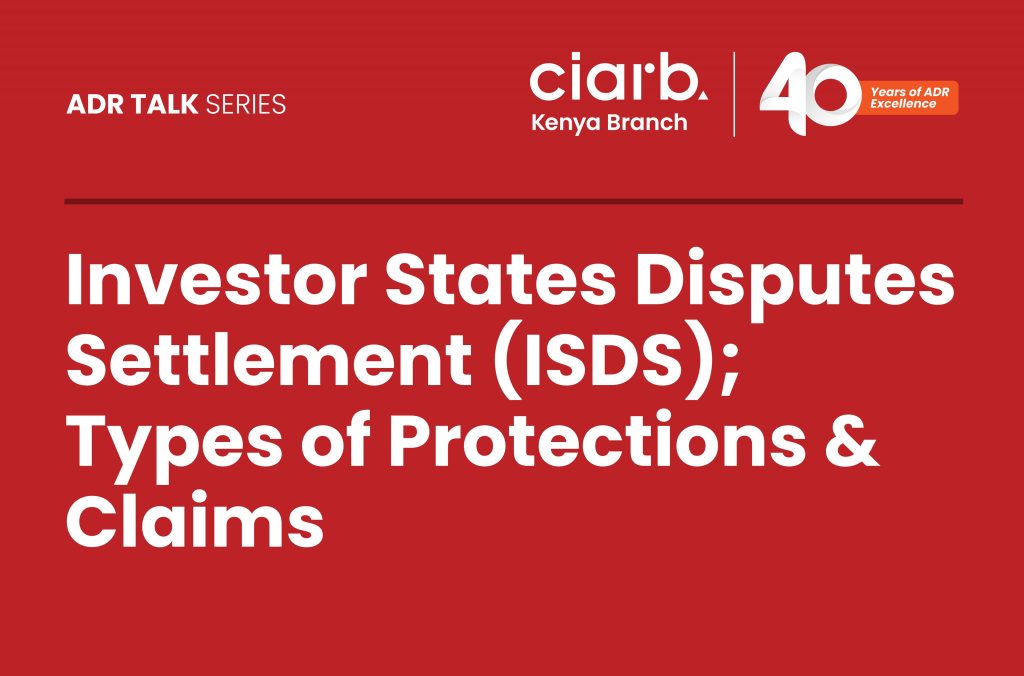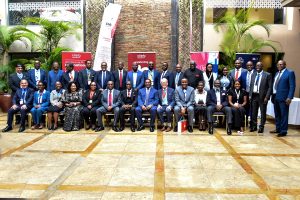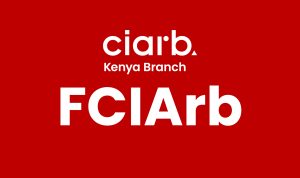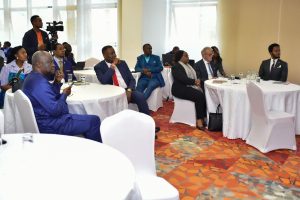ADR Talk Series on Investor-States Disputes Settlement (ISDS): Types of Protections and Claims was held on 16th Feb 2024. The panelists were Mr. Kamau Karori SC C.Arb, Ms. Ndanga Kamau, Ms. Agnes Akal and Bernard M. Nyaga ACIArb The webinar brought together top industry players in foreign direct investment (FDI) and accomplished legal practitioners in Investor-State Arbitration (ISA). This was a conversation about the settlement of investments in close up and possible areas of reform to the ISDS system in the long shot
The Concept of Investor States Disputes Settlement
Senior Counsel Kamau Karori set the foundation of the webinar by putting the ISDS system into context. He defined Investor States Disputes Settlement as the way in which investors can make claims against a state on an allegation of breach of a treaty or interference with their investment. The Panelists unanimously agreed that ISDS is relevant and necessary since it steers clear of litigation of the dispute in the host country of the investment. They also agree that it is a confluence of three competing interests as described below;
- The interests of states and governments in the developing world to attract FDI
- The interests of the investors who are primarily interested in the resources of developing countries
- State to state interests where a state seeks to protect its citizens investing in foreign states
In the meantime, ISDS is lauded as an innovation to balance the interests at play. Previously, the investors had to rely on diplomatic protection. The investors were forced to return to their home states and prompt the home government to espouse a claim against the host state. An injury to the investor was seen as an injury to the home state.
According to the panelists, the diplomatic protection measure enabled states to take advantage of the injury to settle scores. For example, states would lodge warships in the seas of the host state as retaliation. In addition, it was no longer feasible due to the fulfilment of nationality conditions and the exhaustion of local remedies.
The utility of arbitration in the settlement of investment disputes
A suitable means of settling arising disputes between states and states as well as between investors and states became necessary. Under the ISDS system, states voluntarily submitted themselves to arbitration. One of the earliest disputes was between the United States and the Great Britain regarding Alabama claims. This was followed by the introduction of full range of mechanisms such as mediation, reconciliation and negotiations. Consequently, the ISDS system has been lauded for its accessibility to aggrieved investors.
The binding instruments that give effect to the ISDS system are Bilateral Investment Treaties (BITs), multilateral treaties, contracts and domestic laws. Domestic laws may include sector-specific laws such as the mining sector and legislation that seeks to promote foreign investments. These instruments lay the ground for the application of procedural rules during the settlement of the dispute. The procedural rules may include UNCITRAL Model Law, laws governing the contract and the arbitration agreement, general principles of international and contract law, and customary international law.
The panelists also delved into the Africa Free Continental Trade Area (AFCFTA). It is an investment protocol agreed on February 2023. However, states were unable to agree on the inclusion of arbitration as the preferred mode of dispute resolution. It provides for amicable settlement of disputes in Article 46, but does not specifically name arbitration. The experts flagged the inability of member states to agree on the precise dispute resolution method, ideological differences and the secrecy in which the investment proposal was kept.
Initiation of ISDS proceedings
The experts contended that that treaty provisions are critical in the initiation of proceedings. Such provisions must be contained in the BITs and multilateral investment treaties stipulating the manner of continuing proceedings. Conversely, Ms. Ndanga Kamau affirmed that states only have a chance of presenting a counterclaim in lieu of lodging actual claims against investors. There have been several proceedings involving the Republic of Kenya;
- The dispute in Cortec Mining Kenya Limited, Cortec (Pty) Limited and Stirling Capital Limited v Republic of Kenya emanated from the Kenya-United Kingdom Bilateral Investment Treaty.
- The dispute in the construction of Arror and Kimwarer dams originated from the Contract between an Italian investor and Kerio Valley Development Authority.
Types of Protections and Claims in Investor-State Disputes
The claims that may be brought against host states of the investment include a breach of obligation to provide for fair and equitable treatment, expropriation which is intended to protect against nationalization of the investor’s investment, failure to satisfy stabilization requirements, breach of the obligation of transfer of funds, and the application of the favoured nation clause. The exception to such claims may occur where the state’s actions are premised on public good, adequate compensation and not done in a discriminatory manner. The conventional test for discriminatory treatment is whether the same treatment would be accorded to the local investors.
The state may raise certain defences such as lack of jurisdiction of an arbitral tribunal, that the investment in question is a qualified investment, that there was no intended expropriation, necessity such as emergency, illegality and impropriety. Illegality and impropriety arose in Kenya Airports Authority v World Free Company Limited t/a Kenya Duty Free Complex. The arbitral tribunal held that the licenses to the investor has been acquired through bribery of the late President Moi. Another defence that can be raised is frustration where it is impossible to perform as was the case in Kinangop Windpark Ltd vs Republic of Kenya. Some of the reliefs that investors may be entitled include; direct and indirect damages which occurred in the course of investment on account of loss of profit, restitution which intends to place an investor in their original financial position but for the state’s breach, specific performance requiring the host state to comply or do a certain thing, declaratory and injunctive reliefs.






